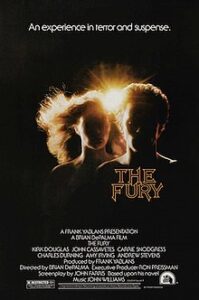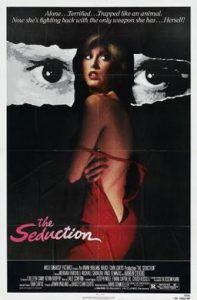The Fury-1978
Director Brian De Palma
Starring Kirk Douglas, Amy Irving, John Cassavetes
Scott’s Review #1,446
Reviewed October 15, 2024
Grade: A-
The Fury (1978) is one of Brian De Palma’s films that flies under the radar and is underappreciated. It contains many of his trademark effects like slow-motion camerawork and incorporates actors who appear in more than one of his psychological thriller films.
The story might be more complicated than it needs to be and while legendary actor Kirk Douglas gets top billing he disappears for a good part of the film before returning towards the end. He hands the reins to Amy Irving who capably carries the rest of the film.
This is a small gripe for a film that ranks pretty close to classics like Dressed to Kill (1980), Carrie (1976), and Blow Out (1981).
I’m as guilty as anyone else for underappreciating The Fury since it’s only my second time viewing it.
The all-star cast features John Cassavetes as the villain, Carrie Snodgress, Charles Durning, Douglas, and Irving. That’s enough to make cinema fans want to see it. There are also unique actors in small roles who flesh out the quirky cast in a major win.
The screenplay by John Farris was based on his 1976 novel of the same name which feels a lot like a popular Stephen King novel.
The Fury utilizes the talents of esteemed John Williams who scored such greats like Fiddler on the Roof (1971), The Poseidon Adventure (1972), and Jaws (1975), to name a few. The highly lauded composer aptly uses the music to enhance the overall product.
Events start in Israel when a plot separates CIA agent Peter Sandza (Douglas) from his son, Robin (Andrew Stevens), but the distraught father manages to see through the ruse.
He realizes that Robin is being held at an institute by Ben Childress (Cassavetes) because the teenager possesses supernatural powers that Ben intends to use as weapons.
Meanwhile, Gillian (Amy Irving), a teen with telekinesis, forms a psychic connection to Robin and teams up with Peter to find and rescue him. They are forced to endure villains intent on destroying them for their gain.
I am amazed how well the film, made in 1978, holds up tremendously decades later considering the characters play dated video games and the automobiles are very 1970s. The overindulgence of 1970s ‘stuff’ is what holds the most appeal.
Appealing is the glimpse at hundreds of extras appearing in the many exterior Chicago scenes. While Gillian and her friend La Rue (Melody Thomas Scott) stroll down the boardwalk they pass teams of regular people harkening back to a time long ago.
The unwieldy American sedans popular in the mid-1970s pepper the streets of Chicago while the sofa and carpet styles of the time are prominently featured at the Paragon Institute feeling like a nostalgic hug in authenticity.
When the character of Gillian is introduced during a high school sequence parallels to the film Carrie are immediately noticed. Carrie and Gillian are both high school students, who possess psychic powers, including telekinesis, and these powers harm people who physically touch or provoke her.
The kicker is that Irving also appeared in Carrie but not as the title character.
The best scenes are when Hester (Snodgress) is struck and killed by a car propelling her bloody body through the windshield or when Institute employee, Dr. Susan Charles (Fiona Lewis) is tortured and spun to death over a lavish dinner table setting.
The food references are plentiful, mouthwatering, and fun to track. Hester and Gillian chat and giggle over heaping hot fudge sundaes, while scrambled eggs and dinner are mentioned during other scenes.
Some plot holes or inexplicable story points like Robin’s turn into a psycho and turning on his father because another psychic will replace him aren’t as compelling as other points of the film.
During one scene Gillian has Robin’s powers transfer to her causing her body to writhe and contort in an unconvincing way and Irving looks plain silly.
Being a huge De Palma fan I’m glad I dusted The Fury (1978) off the shelf because it’s a terrific watch with an exceptional cast. It contains many of De Palma’s trademarks making it fantastic, especially for his fans.

